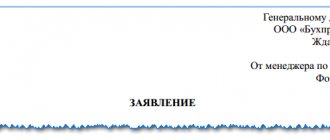Hello! In this article we will talk about deposited wages (ESW).
Today you will learn:
- What is DPD and when does it occur?
- When and how can you get a DPP;
- How to reflect deposited wages in accounting.
Now that most organizations use bank debit cards to transfer wages to employees rather than cash, the term escrowed wages is used less and less. However, businesses that issue payroll in cash may encounter this term.
What is deposited wages (DS)
To understand the concept of escrowed wages, you first need to understand the terms escrow and wages.
Escrow means the process of storing. Depositing in a bank is storing free money.
Salary is an amount paid in monetary equivalent to an employee for the amount of work performed in accordance with the employment contract.
Employees of organizations can receive salaries in 2 ways - by card or in cash. If the organization pays in cash, then it is required to allocate a safe to store the money. The safe must be locked with a key. The key in a single copy is kept exclusively by the cashier, and the duplicate is kept by the head of the organization.
Cash transactions reflect the movement of funds. They are carried out by banks and other organizations and enterprises.
The term “cash transactions” includes:
- Receiving money from suppliers;
- Transfer of amounts to suppliers;
- Receiving proceeds from the sale of goods;
- Remuneration of employees;
- Disbursement of deposited funds.
Cash transactions must be completed correctly.
The cashier must complete a series of documentation, which includes:
- Cash book – a book in which cash transactions are recorded;
- Payroll – a document according to which employees are paid salaries;
- Receipt cash order - a document that shows how much money has been received at the cash desk;
- Expenditure cash order (RKO) is a document that shows how much money was issued from the cash register.
It should also be noted the need for audit activities.
Cash audit is control over the correctness and legality of manipulations with cash.
The audit is carried out unscheduled by a specially appointed commission. At the appointed time, the commission recalculates the money and checks the maintenance of all documentation.
The cashier may issue a salary only in the presence of the employee receiving the salary. There cannot be any unauthorized persons. The employee must sign for receipt of salary.
But there are situations when an employee, for objective reasons, cannot attend work and receive a salary. Then the cashier writes the word “deposited” next to the employee’s name on the payslip and fills out the RKO. Ch. The accountant must ensure that the documentation is completed correctly.
Thus, deposited wages are cash payments not received by an employee due to various circumstances.
It is important to note that the amount is considered deposited if the employee, for his own reasons, was unable to receive his salary. The reasons may be the following: vacation, business trip, illness, etc. If the reason is the employer, then this violates labor laws and may incur administrative or even criminal liability.
We can talk about DPZ only if the payment of wages is carried out in cash. If employees receive their salary on a bank card, then the issue of depositing disappears, since all funds are received on time directly to the employee’s account.
It should also be said that tax calculations and other contributions are not related to escrow, since such calculations are carried out at the time of salary calculation, and not at the time of receipt. Personal income tax is transferred no later than the day when the bank transfers money for wages to the organization's cash desk.
There are 3 wirings that need to be done:
- D50 K51 - money received from the bank;
- D68.01 K51 – personal income tax is listed;
- D69 K51 – transfers to social funds.
The appearance of DZP must be reflected in the register of depositors. There is no strictly approved form for filling out this register. It can be completed in free form, observing the availability of the details shown in Table 1. Table 1. Details for filling out the register of depositors
| № | Props name |
| 1 | Name of the organization |
| 2 | Hh.mm.yy registry |
| 3 | Hh.mm.yy formation of the deposited amount |
| 4 | Statement number for calculation |
| 5 | FULL NAME. and the personnel number of the employee who did not receive a salary |
| 6 | Amount of DPZ |
| 7 | Summary of the register of uncollected funds |
| 8 | Cashier's signature indicating the signature decryption |
| 9 | Additional information required by the enterprise |
Transfer of deposited salary to the bank
Until 2014, the law required the preparation of many documents: a register of deposited amounts, a ledger for recording deposited amounts, etc. Since 2014, all these documents are not required. But to avoid confusion in accounting, it is quite convenient to take into account all amounts using them. The accounting department will know exactly how much money was not issued, when it was transferred, etc.
First of all, we fill out the register of deposited amounts. This document is kept in free form. Typically it states:
- Name of the organization;
- Date of registration of the register;
- The period of occurrence of the deposited salary (i.e. for what period the employee did not collect the salary);
- Payroll number;
- Last name, first name, patronymic of the employee who did not come for the money;
- Amount of deposited salary;
- The total amount of all deposited payments;
- Cashier's signature.
Next, the data is entered into the ledger for recording deposited amounts. Such a book is also compiled in any form and is kept for a year. In it, a separate line is entered for each depositor (the person who did not come to collect his salary). The last name, first name, patronymic of the employee, his personnel number, the deposited amount and the period for which this amount should have been paid are indicated.
Next, the money is transferred to the bank . This is done by postings Dt 70 Kt 76-4 (designation of deposited salary) and Dt 51 Kt 50 (crediting deposited salary to a bank account). These postings are accompanied by filling out the corresponding documents.
Note ! For each salary payment, the company must make deductions for insurance contributions to extra-budgetary funds. In accordance with Article 11 of Law No. 212-FZ, contributions are calculated on the date of payment of wages indicated in the documents (and not on the date of actual receipt of money). Therefore, even if the salary was returned to the bank, insurance premiums on it must still be paid on time.
The procedure for receiving and features of payment of DPZ
The employer is obliged to pay unpaid wages upon request of the employee. He can apply orally or in writing. When applying in writing, you must write a statement addressed to management.
If limits allow, the deposited amount can be stored in the cash register at the enterprise. If the limits are exceeded, these funds are sent back to the banking organization.
According to the regulations, the cash register limit is the maximum permitted amount of money that can be left in the cash register at the end of working hours.
The manager sets the cash limit independently, taking into account the instructions of the Central Bank of the Russian Federation.
If the money is in the cash register, then it can be returned to the employee without any problems upon first request. If the limits are exceeded, the employee can receive his salary along with the next planned payments. But if he insists on immediate return, then the organization sends a request to the bank to transfer the required amount of money.
Next, after the money is received, the cashier issues a settlement settlement in the name of the employee to pay the unpaid salary. The accountant must maintain a book of deposits, which should reflect the numbering of orders and dates. The consumables must be signed by the manager and the chief accountant and left to be stored at the enterprise.
The employer is obliged to issue the DPZ in full. If some amount is withheld, the employee can go to the labor inspectorate. This process is regulated by the Labor Code. After 3 months of overdue wages, the court will accept the claim.
In what situations is depositing relevant?
Cash transactions for the payment of wages are relevant for small companies whose managers need a small number of employees to achieve planned production efficiency indicators. In such a situation, it is unprofitable to resort to banking services for a salary project, since it is cheaper to pay people through a cash desk. Such operations often turn out to be dependent on external factors due to the inability of a person to receive money due to his absence from work.
What is Deposited Salary?
The deposit procedure is not included in the list of accounting operations by large companies, since if they have a large staff of people, they use non-cash methods of settlements with them. Making payments through the cash register is unprofitable, since the operation will take up the cashier’s entire working day, which will make it impossible to serve customers who pay for purchases or services in cash.
Storage periods and accounting
After receiving money from the bank, it cannot be kept in the cash register for more than three days. Otherwise, the amounts are deposited and sent back to the banking organization.
The statute of limitations for deposited amounts is not regulated by the laws of the Russian Federation. However, there is a general period for claims, which is 3 years. After this time has passed, the DPA is classified as unclaimed amounts and goes into the organization’s income. Reflected in the article “profit not related to core activities”.
The storage period for the DPP accounting book is 5 years. They count not from the moment of debt, but from January 1 of the following year after the year of debt.
DPZ is taken into account on account 76.4.
The following accounting entries are used to deposit wages:
- D70 K76.4 – deposit of funds;
- D51 K50 – return of deposited funds to the bank;
- D50; K51 – the bank sends the deposited amount to the enterprise’s cash desk upon demand;
- D76.4 K50 – DPZ issued.
Once three years have expired, the deposited amount is considered unclaimed and is recorded in the 91 “Non-operating expenses” account. Reflected by accounting entry: D76.4 K91.
Example. The organization's employees received wages in the amount of 400 thousand rubles on March 27. On March 31, the bank transferred funds to the cash desk for wages in the amount of 348 thousand rubles. Also on this day, the amount of personal income tax was sent - 52 thousand rubles. One of the employees did not receive his salary on time because he was on a business trip. On April 10, a salary in the amount of 23 thousand rubles was received. An inventory was taken at the end of March. Based on its results, an unpaid payment in the amount of 20 thousand rubles was revealed. The statute of limitations ends on April 3 of this year.
| Type of transaction | Debit | Credit | Amount, thousand rubles |
| 27.03. | |||
| Payroll | 20 | 70 | 400 |
| Personal income tax listed | 70 | 68.3 | 52 |
| 31.03 | |||
| Personal income tax listed | 68.3 | 51 | 52 |
| Receiving funds for salaries | 50 | 51 | 348 |
| 3.04 | |||
| Payment of salaries for March | 70 | 50 | 325 |
| Amount deposited but not paid | 70 | 76.4 | 23 |
| The deposited amount was returned to the bank | 51 | 50 | 23 |
| Write-off of unclaimed debt | 76.4 | 91.1 | 20 |
| 10.04 | |||
| The bank transferred the DPP | 50 | 51 | 23 |
| The employee received DPZ | 76.4 | 50 | 23 |
How does escrowed wages affect taxes?
Personal income tax deductions are made before salaries are credited to employees. Therefore, depositing does not affect personal income tax deductions in any way.
However, the funds returned to the current account change the balance of the enterprise. If the enterprise is taxed according to the main system or according to the simplified tax system15, then the deposited salary is included in the column “enterprise income”, and in order to remove it from there, you need to wait until the employee comes for the money. If taxation is carried out according to the UTII system, depositing wages will not affect tax deductions in any way.
Expiration of the statute of limitations
The deposited salary must be kept intact in the company's account for 3 years. If during this time no one has demanded the money, in accounting they are included in other income, and in tax accounting - in the item of non-operating income.
This is done according to the following algorithm:
- An inventory of wage calculations is carried out with all employees;
- As a result, an inventory act is drawn up;
- A corresponding accounting certificate is drawn up;
- An order is issued from the head of the organization.
All these actions must be carried out on the last day of the reporting period, in which the statute of limitations expires.
Postings
Any financial transaction carried out by a business entity is reflected in the accounting entry for a specific accounting account. The deposit procedure is no exception.
Accounting entry
Registration of the transfer of money from a bank account to the cash desk occurs through movement according to the debit 51–credit 50 scheme, identifying the operations of allocating funds to the cash desk from a bank current account. The issuance of money with the status of wages from the cash register is carried out according to the debit 70-credit 50 scheme. If the funds have the status of deposited, then their movement is determined according to the scheme “debit 70 - credit 76, subaccount 4”. Accounting operations related to the payment of wages, to its deposit and to the return of the depositor to the recipient are not complicated and can be carried out in a matter of minutes if there is a positive resolution from the head of the company to carry out the financial transaction.
What are the deadlines for issuing salaries through the cash register?
So, the money was received at the cash desk, however, after all the payments, a certain amount on the balance still remained unpaid, since no one claimed it. Financial regulations stipulate strictly limited time periods during which cash balances are allowed to be kept in the cash register. After distributing salaries to employees, unclaimed money exceeding the limit of allowable amounts in the cash register should not be stored in it, but will be returned to the company's bank accounts. Money for salaries is stored in the organization's cash desk, and, accordingly, is issued within three to five days, including the day from which they begin to be paid.
Usually in Russia this is still three days, but for the northern regions of our country an exception is made - there “real money” for salaries can be stored for all five days. So, if the location of the company is not on the shores of the Arctic Ocean, then the cashier has the right to keep the amount not claimed on time at the enterprise for three days - while the entire salary is paid. It turns out, on the one hand, the organization took actions aimed at ensuring that the employee would not be left without his earnings. On the other hand, this did not produce any results; the money remained with the company. Such salaries are no longer reflected as the company's debt to employees - they become deposited funds. It should be noted that wages, the payment of which was delayed due to the fault of the enterprise, cannot be deposited.









